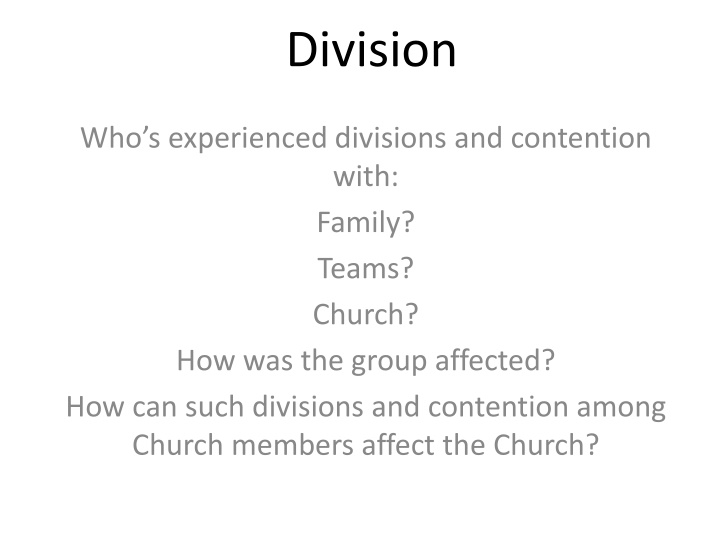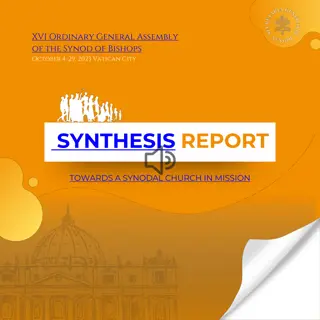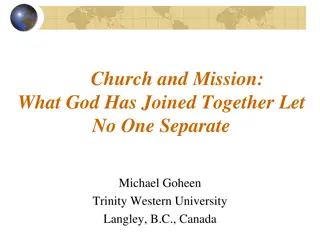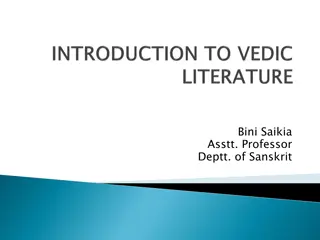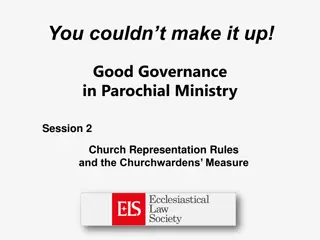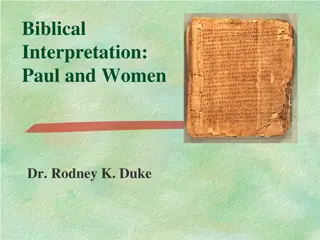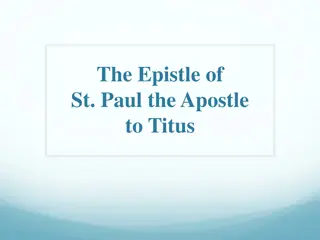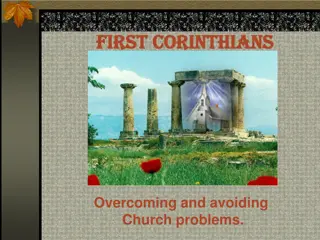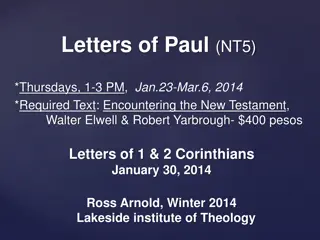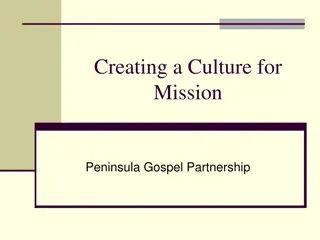Dealing with Divisions in Church and Paul's Mission
The content touches on Paul's missionary journey to Corinth and the repercussions of divisions within the Church community. It delves into the importance of unity among Church members and the necessity to eliminate contention. Additionally, it discusses the concept of understanding spiritual matters through God's Spirit, as emphasized by Boyd K. Packer.
Download Presentation

Please find below an Image/Link to download the presentation.
The content on the website is provided AS IS for your information and personal use only. It may not be sold, licensed, or shared on other websites without obtaining consent from the author.If you encounter any issues during the download, it is possible that the publisher has removed the file from their server.
You are allowed to download the files provided on this website for personal or commercial use, subject to the condition that they are used lawfully. All files are the property of their respective owners.
The content on the website is provided AS IS for your information and personal use only. It may not be sold, licensed, or shared on other websites without obtaining consent from the author.
E N D
Presentation Transcript
Division Who s experienced divisions and contention with: Family? Teams? Church? How was the group affected? How can such divisions and contention among Church members affect the Church?
Pauls Second Mission During his second missionary journey, Paul traveled to a city called Corinth, where he preached the gospel. Many people were baptized at that time (see Acts 18:1 18). Later, while Paul was preaching in Ephesus, he learned that problems had arisen among Church members in Corinth because some of the converts were reverting to their past beliefs and practices of idol worship. Paul wrote to the Church members in Corinth to strengthen them and remind them of their commitment to serve the Lord.
Pauls Second Mission 1 Corinthians 1:10: The Standard (glance at 1 Corinthians 1:12 16 to see what was dividing the church) What can we do as Church members to eliminate divisions and contention in our families? In our wards? (Write students responses on the board.) What blessings can we receive from being united and eliminating contention? When have you been blessed as a result of being united in a class, quorum, or ward or branch?
1 Corinthians 2:9-10 Why is it important for us to believe that we can only know and understand the things of God through His Spirit? President Packer asked the attorney, Do you know what salt tastes like? Of course I do. When did you taste salt last? Why, just as we had dinner last night. You just think you know what salt tastes like I know what salt tastes like as well as I know anything, said the attorney. If I gave you a cup of salt and a cup of sugar and let you taste them both, could you tell the salt from the sugar? Now you are getting juvenile, was his reply. Of course I could tell the difference. I know what salt tastes like. It is an every day experience; I know it as well as I know anything...
Boyd K. Packer Could you explain to me in words, just what it tastes like? After some thought the attorney ventured, Well I it is not sweet, and it is not sour. You have told me what it isn t, was the answer, not what it is. After several attempts he admitted failure in the little exercise of conveying in words knowledge so commonplace as that. He found himself quite helpless to answer the question...
Boyd K. Packer Elder Packer bore testimony once again. He then concluded the conversation by saying, My friend, spiritually speaking, I have tasted salt. Young people, do not apologize or be ashamed because you cannot frame into words that which you know in your heart to be true (Boyd K. Paacker, C.R., Oct. 1964, 128-29).
Choose Your Own Adventure 1 Corinthians
http://z.about.com/d/tattoo/1/0/9/C/hbear.jpg MakaFeke.jpg http://cache.consumerist.com/assets/resources/2006/06/300px-Rotting_fruit.jpg http://upload.wikimedia.org/wikipedia/en/thumb/7/76/LDS_name_tags.jpg/180px-LDS_name_tags.jpg
http://z.about.com/d/tattoo/1/0/9/C/hbear.jpg MakaFeke.jpg http://cache.consumerist.com/assets/resources/2006/06/300px-Rotting_fruit.jpg http://upload.wikimedia.org/wikipedia/en/thumb/7/76/LDS_name_tags.jpg/180px-LDS_name_tags.jpg C:\Users\RichardsED\AppData\Local\Microsoft\Windows\Temporary Internet Files\Content.IE5\CMN3YLYG\MC900411894[1].wmf
1 Corinthians 3:16-17 What is the church s current council about Body Piercings/Tatoos?
1 Corinthians 3:16-17 True to the Faith under Body Piercing and Tattooing 1 Corinthians 4:5 How to treat tattooed/pierced people List all the adjectives of a Temple 1 Corinthians 6:18-20 According to verses 10-11, what did Paul remind these Saints about themselves? In what ways do we see 1 Corinthians 6:12 today? What do you think Paul meant by the phrase ye are not your own in verse 19?
1 Corinthians 3:16-17 Any sexual intimacy outside of the bonds of marriage I mean any intentional contact with the sacred, private parts of another s body, with or without clothing is a sin and is forbidden by God (Elder Richard G. Scott in Conference Report, Oct. 1994, 51; or Ensign, Nov. 1994, 38).
1 Corinthians 3:16-17 Please, never say: Who does it hurt? Why not a little freedom? I can transgress now and repent later. Please don t be so foolish and so cruel. You cannot with impunity crucify Christ afresh [see Hebrews 6:6]. Flee fornication [1 Corinthian 6:18], Paul cries, and flee anything like unto it [D&C 59:6], the Doctrine and Covenants adds. Why? Well, for one reason because of the incalculable suffering in both body and spirit endured by the Savior of the world so that wecould flee [see especially Doctrine and Covenants 19:15 20]. We owe Him something for that. Indeed, we owe Him everything for that ( Personal Purity, Ensign, Nov. 1998, 76).
1 Corinthians 11 (What about long hair for boys? 1 Corinthians 11:14) In 1 Corinthians 11:17 22, Paul noted a report he had received that when the Corinthian Saints gathered together to partake of the sacrament, there were dissentions, or contention, among them. Paul condemned the Saints for turning these gatherings into common meals rather than preserving the sacredness of the sacrament ordinance. 1 Corinthians 11:27 30: How do you know if you are worthy ? We do not need to be perfect in order to partake of the sacrament, but [we] should have a spirit of humility and repentance in [our] heart (True to the Faith: A Gospel Reference [2004], 148). What questions might help living 1 Corinthians 11:28?
1 Corinthians 11 Elder John H. Groberg of the Seventy: If we desire to improve (which is to repent) and are not under priesthood restriction, then, in my opinion, we are worthy. If, however, we have no desire to improve, if we have no intention of following the guidance of the Spirit, we must ask: Are we worthy to partake, or are we making a mockery of the very purpose of the sacrament, which is to act as a catalyst for personal repentance and improvement? If we remember the Savior and all he has done and will do for us, we will improve our actions and thus come closer to him, which keeps us on the road to eternal life. If, however, we refuse to repent and improve, if we do not remember him and keep his commandments, then we have stopped our growth, and that is damnation to our souls ( The Beauty and Importance of the Sacrament, Ensign, May 1989, 38).
1 Corinthians 1:14-17 How do we measure whether or not a missionary was successful?
Culturally and symbolically, why would he use an athlete? What principle can we learn from verse 25concerning what we must do to obtain eternal life?
Elder M. Russell Ballard: In the premortal world before we left the presence of Heavenly Father, He warned and cautioned us about new experiences we would have in mortality. We knew that we each would have a physical body of flesh and bone. Never having been mortal before, we had no experience dealing with the temptations of mortality. But Heavenly Father knew and understood. He charged us to control our mortal bodies and to make them subject to our spirits. Our spirits would have to master the physical temptations that our bodies would encounter in a temporal world. Spiritual power over the influence of Satan comes to us by keeping the commandments of our Lord, Jesus Christ" (in Conference Report, Apr. 1993, 5; or Ensign, May 1993, 6).
You cannot inherit eternal life, unless your appetites are brought in subjection to the spirit that lives within you, that spirit which our Father in Heaven gave. I mean the Father of your spirits, of those spirits which he has put into these tabernacles. The tabernacles must be brought in subjection to the spirit perfectly, or your bodies cannot be raised to inherit eternal life. Seek diligently, until you bring all into subjection to the law of Christ. If the spirit yields to the body, [the spirit] becomes corrupt; but if the body yields to the spirit [the body] becomes pure and holy (Teachings of Presidents of the Church: Brigham Young [1997], 204 5).
What happens if you have bad fruit and you leave it with good fruit? 1 Corinthians 5:1-2
What happens if you have bad fruit and you leave it with good fruit? Do not company with fornicators not because you are too good for them but, as C. S. Lewis wrote, because you are not good enough. Remember that bad situations can wear down even good people. Joseph had both good sense and good legs in fleeing from Potiphar s wife. (Neal A. Maxwell, The Stern but Sweet Seventh Commandment, in Morality[1992], 29)
What happens if you have bad fruit and you leave it with good fruit? What can we do without compromising our standards to help individuals who have embraced sin? 1 Corinthians 5:6-13 How is this process accomplished in the modern church? (http://www.mormonnewsroom.org/article/church-discipline)
Format for Church Judgment (Church Disciplinary Councils) Bishops council (Bishopric and Executive Secretary or Clerk) Stake council (Stake presidency, high councilors, and Clerk) Read Doctrine and Covenants 102:1-4
What sins necessitate a disciplinary council? Disciplinary councils may be convened following serious transgression: abortion, attempted murder, rape, forcible sexual abuse, intentionally inflicting serious physical injuries on others, adultery, fornication, child abuse, spouse abuse, deliberate abandonment of family responsibilities, robbery, embezzlement, theft, sale of illegal drugs, or apostasy. A disciplinary council must also be held when a prominent Church leader commits a serious transgression.
Informal Church Discipline When a bishop learns of a transgression, he first counsels with the member. When the sin is not grievous, the bishop may decide that no disciplinary action is needed. Another option the bishop has is to place the member on informal probation, temporarily restricting his privileges as a Church member.
Formal Church Discipline The spirit of inspiration may move the Church leader to convene a disciplinary council. If a serious transgression has been committed, he should confer with the stake president to decide if a council should be held. The purpose is threefold: (1) to save the soul of the transgressor, (2) to protect the innocent, and (3) to safeguard the Church s purity, integrity, and good name.
What is the process of Disciplinary Councils? Read Doctrine and Covenants 102:12-16 A disciplinary council begins with an opening prayer, followed by a statement of the reason for the council being convened. The member is asked to tell in simple and general terms about the transgression and to explain his or her feelings and what steps of repentance he or she has taken. The member may respond to clarifying questions from the leaders. Then he or she is excused, and the leaders counsel together, pray, and reach a decision.
How Does discipline help the transgressor? I remember as a child occasionally coming unkempt to the dinner table. My mother wisely sent me to clean up and then return. My parents would have been pained if I had taken offense and had run off and I would have been foolish to do so. In the same way, the servants of the Lord occasionally find that they must, in loving concern, send some of Heavenly Father's children out the door so they can return clean once again. The Lord does not want us to "miss supper." In fact, he has a great feast prepared for those who return clean and pure through the door. He is greatly saddened when anyone decides they prefer to be unclean and miss the meal, or when they find an excuse to take offense, or when they run away. He is pleased to extend the chance to start over. M. Russell Ballard, Ensign, Sept. 1990, p. 12.
Possible Actions of Disciplinary Councils A council can reach one of four decisions: (1)No action (2)Probation (3)Disfellowshipment (4)Excommunication
Probation A temporary state of discipline, imposed as a means to help the member fully repent.
Disfellowshipment Disfellowshipped persons retain membership in the Church, but are not entitled to offer public prayers or to give talks. They may not hold a Church position, take the sacrament, vote in the sustaining of Church officers, hold a temple recommend, or exercise the priesthood. They may attend church, pay tithes and offerings and continue to wear temple garments if endowed.
Excommunication Excommunicated persons are no longer members of the Church and are encouraged to repent through the Atonement of Jesus Christ and to seek His forgiveness.
How do people return? Church disciplinary action is not intended to be the end of the process rather, it is designed to be the beginning. When the person has progressed through repentance, a new disciplinary council his held to consider what action needs to be taken and if rebaptism is a possibility.
How do people return? After rebaptism, his or her membership record shows the original baptism date, with no reference to excommunication. No sooner than a year after rebaptism, a restoration of blessings occurs (restoring priesthood office and temple blessings), typically performed by a general authority, but occasionally by an authorized stake president.
What happens if you have bad fruit and you leave it with good fruit? Question: 1 Corinthians 7:1 Answer: 1 Corinthians 7:2-4
Physical intimacy between husband and wife is beautiful and sacred. It is ordained of God for the creation of children and for the expression of love between husband and wife. God has commanded that sexual intimacy be reserved for marriage (For the Strength of Youth [booklet, 2011], 35). The power of procreation is not an incidental part of the plan; it is the plan of happiness; it is the key to happiness. The desire to mate in humankind is constant and very strong. Our happiness in mortal life, our joy and exaltation are dependent upon how we respond to these persistent, compelling physical desires (Boyd K. Packer, The Plan of Happiness, Ensign or Liahona, May 2015, 26). Why is procreation the ability to create mortal life so important in Heavenly Father s plan?
What question lead to 1 Corinthians 7:12-14? What examples have you seen in which a member of the Church has had a positive effect on family members who were either not members of the Church or not active in the Church?
1 Corinthians 11:3,11 By divine design, men and women are intended to progress together toward perfection and a fulness of glory. Because of their distinctive temperaments and capacities, males and females each bring to a marriage relationship unique perspectives and experiences. The man and the woman contribute differently but equally to a oneness and a unity that can be achieved in no other way. The man completes and perfects the woman and the woman completes and perfects the man as they learn from and mutually strengthen and bless each other ( Marriage Is Essential to His Eternal Plan, Ensign, June 2006, 83 84). How do men and women complement each other in a family?
1 Corinthians 11:3,11 Men and women are equal in God s eyes and in the eyes of the Church, but equal does not mean they are the same. The responsibilities and divine gifts of men and women differ in their nature but not in their importance or influence. Our Church doctrine places women equal to and yet different from men. God does not regard either gender as better or more important than the other ( Men and Women in the Work of the Lord, New Era, Apr. 2014, 4).
1 Corinthians 10:12-13 Are there some things that trap youth more easily than they do adults? One of the great myths in life is when [individuals] think they are invincible. Too many think that they are [made] of steel, strong enough to withstand any temptation. They delude themselves into thinking, It cannot happen to me ( It Can t Happen to Me, Ensign, May 2002, 46). In what situations might people allow themselves to be exposed to temptation, thinking they are strong enough to withstand it?
1 Corinthians 10:14 CR: Alma 13:27-28 Each of us it is infinitely better to hear and heed the call of conscience, for conscience always warns us as a friend before punishing us as a judge. (Thomas S. Monson, Oct. 2002 Gen. Conf.) When any unworthy desires press into your mind, fight them, resist them, control them. If you do not act on temptations, you need feel no guilt. They may be extremely difficult to resist. But that is better than to yield and bring disappointment and unhappiness to you and those who love you. (Boyd K. Packer, Oct. 2000)
Temptation "The moment we revolt at anything which comes from God, the devil takes power" (Teachings of the Prophet Joseph Smith, 181). President George A. Smith: "There is a line of demarcation well defined between the Lord's territory and the devil's territory. If you will remain on the Lord's side of the line, the adversary cannot come there to tempt you. You are perfectly safe as long as you stay on the Lord's side of the line. But . . . if you cross onto the devil's side of the line, you are in his territory, and you are in his power, and he will work on you to get you just as far from that line as he possibly can, knowing that he can only succeed in destroying you by keeping you away from the place where there is safety" (Oct. 1945, 118).
1 Corinthians 8:9-11, 14:15 Is it OK to serve bacon at a ward breakfast if there s a Jewish convert in the crowd?
